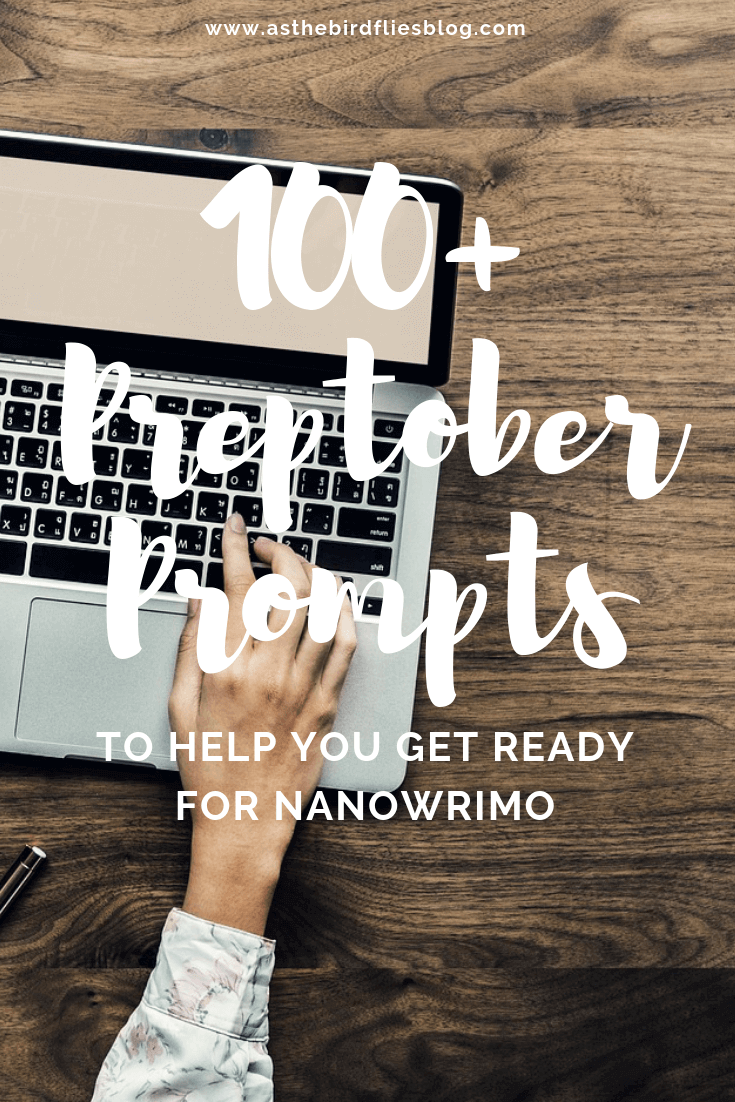Preptober Tips & 100 Preptober Prompts for NaNoWriMo Prep

November and NaNoWriMo (National Novel Writing Month) is just around the corner, and as a six-time NaNoWriMo veteran (with winning AND losing years under my belt) I am excited and ready for some Preptober and NaNoWriMo magic. In a strange way, I almost enjoy all the build up more than the actual month itself (because yes, writing 50,000 words in 30 days is quite hard no matter how many times you do it), and I know I'm not alone.
In fact, I have found that in recent years another month has become just as important and meaningful to writers taking part in NaNoWriMo - October, or Preptober as it is fondly called among those who take part - by sharing what they're doing online, mostly on social media. You should search for the hashtags #preptober, #nanowrimoprep or #nanoprep on social channels to see what everyone is doing.
So, What is Preptober?
Preptober is what it sounds like; the month of October and a month of preparation, specifically NaNoWriMo preparation or NaNoPrep. As it's the month before NaNoWriMo, it is logical that those taking part (which was over 450,000 in 2018) do a little work to get ready.
Indeed it's something that I've blogged lots about before including these NaNoWriMo Prep tips for getting ahead before November (in as little as 30 minutes), ten things that will help during NaNoWriMo, the only NaNoWriMo tips you'll need, and this NaNoWriMo Prep Checklist.
However, until now I haven't actively taken part in "Preptober" on social media or even at my own desk. Partly, this is because the last few years have seen my writing time dwindle considerably (after having two young children), but also I find the effort of NaNoWriMo quite enough, thank you very much, so I like to spend October just mentally and practically preparing myself. Think filling the freezer with meals, cancelling unnecessary social engagements, blocking out time in my diary, telling all my friends and family I will be (even!) slower to replying to WhatsApp messages, and yes, if I can booking a couple more sessions with babysitters or arranging more childcare. I will absolutely be doing this but I also want to be having some fun with Preptober too.
In October 2019, I will be sharing some of these Preptober prompts on the WriteNOW Cards Instagram account using the hashtag #WriteNOWPreptober so please do follow along and join in.
100+ Preptober Prompts for ALL Writers!
Seeing as my blog is not just about writing - in fact it's mainly about travel or specifically about travel to Amsterdam - I like to think that more than a few people come to these pages not having a game plan or a set idea about what they want to write for NaNoWriMo.
In fact, I'm quietly confident many people reading this aren't sure if they should even try to do NaNoWriMo (and let me just quickly answer that question - Yes, YOU SHOULD! Here are 21 good reasons why you should do NaNoWriMo) but I actually think that answering that question becomes easier when you have an idea that you want to write about.
Getting a book idea is not always an easy process and it's completely normal to want to write a book and still not have an exact idea, but it's definitely true that once you have (at least!) one good book or story idea, feeling ready and motivated to write suddenly gets a lot easier. It's also worthwhile spending a little time developing your story or book idea for the same reasons.
With all this in mind, I wanted to create some Preptober prompts for those of you who are going to spend October just figuring out what it is you want to write in November for NaNoWriMo. Not all of these NaNoPrep prompts will be easy to answer and none of them will give you a definitive answer alone, but perhaps after you have answered half or more of them you will start to see some of the themes, topics, ideas, events, people, places and other "things" that really interest and inspire you.
I am sure some people will tell me I'm wrong but I'm fairly certain that it's these things that are form the basis of any great book be it fiction or non-fiction. Oh, yeah, these prompts are for both those of you interested in writing fiction (be it a novel or another form if like me you are a NaNoRebel!) or non-fiction. And yes, they are also for those of you who can't decide whether to write fiction or non-fiction!
General Preptober Tips & Advice About These Preptober Prompts
Let me be clear about all of the NaNoWriMo Prep prompts that follow below:
- There are NO right answers to these questions/prompts. Whatever your respond with is going to help.
- I strongly recommend that you make written notes (handwritten or otherwise) to answer these prompts. And do what you can to keep all your responses and notes in the same place. But if you don't have time or the inclination you can still just read over these prompts, and mentally make a few notes. It will still help you and make a difference!
- Your notes (and/or thoughts) can be as messy or as neat as they evolve. Nobody is going to judge you. There are no awards or extra marks for neatness or quantity.
- You can answer these questions with a few words, or a few pages of words. Or maybe even a doodle or brainstorm. Anything is fine as long as your brain is thinking about the question for a minute or two (or longer!).
- If you really can't come up with an answer of any kind then skip that prompt. Move on to the next. Your time is precious. Don't waste it.
- Each set of prompts are written in a specific order for a reason as some of them build on the former, however you do not have to respond to them in order. You can switch it up as much or as little as you want.
- If you can't answer the majority of these prompts, or if you get stumped by most and feel you don't yet have an idea of what you should write, that's cool! It may mean it's not year year to do NaNoWriMo but I actually think you should wait until 1st November and just sit down and write and see what happens. Some writers THRIVE from this kind of spontaneity. Preptober or planning a story or book just may not be for you. Doesn't mean you can't or shouldn't write one.
- These Preptober prompts are to help you get ready for NaNoWriMo, yes, BUT they're also to help you enjoy the whole process more, to get deeper into your writing and to explore your creativity. They are here to help, but to also bring you JOY!
So they are the rules that aren't rules, if you know what I mean. Now let's get stuck into these Preptober prompts!
40 Preptober Prompts if You Don't Have a Book Idea Yet

Here are your NaNoWriMo Preptober Prompts to help you find an idea for a book or story you can write next month.
These prompts specifically are for those who haven't even decided if they want to write fiction or non-fiction, in fact, they should really help you choose which one while also sparking some creativity for one or the other, or both! If both happens and you have a non-fiction book idea AND a fiction book idea - or you have multiple ideas in any or both genres - I think you should then spend a bit of time doing both the fiction and non-fiction prompts (multiple times for multiple ideas if necessary) below to see which idea you have the most enthusiasm for or the clearest idea/focus on. You can also read this post which is specifically about finding reasons why you should write fiction or non-fiction (or both!).
But first, your Preptober questions to answer if you really have no clue what to write, which FYI, is a much more common feeling among writers than you would think!
- What themes/topics really interest you? Start really broad and then think about sub-topics that fall under each topic to narrow down what you are most intrigued by...
- What stories in the news lately have fascinated or puzzled or moved you the most?
- Do you ever think about the future? What do you think will get better, and what do you think will get worse?
- Name five of your favourite books (fiction or non-fiction).
- Name five of your favourite films.
- Name five of your favourite TV shows.
- What themes or topics do your favourite books/TV shows and films have in common?
- What's one thing you wish you could change about the world?
- What is one thing you wish people would understand or know more about?
- How do you like to feel while reading a book? (Scared, sad, warm inside, inspired, informed, fascinated, happy... etc.)
- How do you like to feel after finishing a book? (Hungry for more, still curious, satisfied, like you've really learned or experienced something... etc.)
- Name one book (or more!) that you think about now and again long after reading it. Do you often think about what happens next?
- Name one book that you read and you thought, "I could have done a better job,".
- What excites you most about a book that you haven't read yet but you have on your To Read List?
- Is there a period of history you know a lot about? Or maybe an event, place or person in history (recent or otherwise!)
- Is there anything in your personal or professional life that you have studied or read a lot about that would surprise people?
- Of all the news stories we hear, which ones make you feel the most sad, or angry?
- What or who gives you hope in the world? Why?
- Name three people or things that really make you laugh. Why are they so funny?
- Name three memories, events or things that make you feel sad. Why is that?
- Name three things that make you feel angry. Why do they make your blood boil?
- Name three things that really confuse you. How do you feel when you don't understand something?
- Name five people alive today who you admire.
- Name five people now dead who you think changed the world.
- Name five places that you wish you could return to.
- Name five songs that take you back to a certain place or time.
- Name three (or more!) of your favourite book genres. Why are these genres the ones you return to again and again. What do they mean to you and what do they promise you?
- Finish the following sentence: "I love to read because...".
- Finish the following sentence: "I love to write because..."
- Finish the following sentence: "Everyone should read books because..."
- You are forced to write a non-fiction book that is about a topic you care and know a lot about. What is that topic?
- When you think about the answer to Question 31, how do you feel? Excited? Inspired? Ready to write? Or unmotivated? Disinterested? Bored already?
- You are going to be forced to write some fiction - a novel or short story or something else. You must do it in order to have an unlimited supply of your favourite dessert. In its most basic form, what is your story about?
- When you think about the story that is the answer to Question 33, how do you feel? Like it's a story that only you can easily tell? Or like it's been done a million times before... OR that it has been done before, but you could do it better!
- Fast forward one year. You have a finished draft of your book ready for editing. What do you want an editor to help you do in order to make your book the best it can be?
- Fast forward two years. You have finished a book and it's about to be published. The blurb ends with this sentence that you must finish: "This book will make you want to....".
- Fast forward three years. You have a book that 100,000s of people have read. What would you like majority of the reviews of your book say?
- You're still fast forward at three years. You have a book that 100,000s of people have read. What does the best possible review of your book read like?
- How much writing experience do you have (on a scale from 1 to 10, 1 being none and 10 being a few years) of writing fiction? And for non-fiction? (The answers to this doesn't dictate what you must write, it just helps you realise what experience you are bringing to your book.)
- It's November 30th and NaNoWriMo is finished. Regardless of how many words you wrote, how easy or how hard it was, what would you like to go into December feeling about the words you did write during November? How would you like to feel about your book at this stage?
31 Preptober Prompts for Writing Fiction

Maybe you've just completed the Preptober prompts above, or perhaps you already have an idea for a story you want to flesh out a bit, well, if that is a fictional story (or stories!) then you can use the following Preptober prompts for those writing fiction.
Again with all the prompts on this page (or anywhere!) there are NO RIGHT ANSWERS, and indeed you may not be able to answer all of the questions because either they're not relevant or perhaps you just don't have enough to say about certain parts of your story yet. This is all okay, and perfectly normal. The purpose of these Preptober prompts, tasks and questions is to help you get ready to write a first draft of a novel (or other!) and I am the first to say that even after a first draft is written, you will still have many (MANY!) unanswered questions about your book - this is why you must edit, edit, edit (and edit some more) that first draft.
But woah! Hold your horses! We are getting ahead of ourselves. Let's just spend a little time each day in October (or even in a few batches or all in one go) responding to these prompts and questions so you can feel more ready to write on 1st November when NaNoWriMo starts.
- What are the five main themes in the story you would like to tell?
- What are the ten words that come to mind when you think about your story? (These can be your personal feelings about the story, about the writing of your story, or it can just be some words that you think will feature a lot be that a character name or a place etc.)
- Think, and maybe write a few sentences, about what you would really like your story to be about. In other words, what would you like someone to subjectively say about your story, rather than thinking in terms of objective categories.
- Now think about what you want you your story to NOT be about. Write a few sentences about what you want your story not to do.
- If your story was written and published right now, and a reader is passing it on to a friend to read. What do you think they would say to their friend about your book? What would you like them to say? What would you hope they would never say?
- Let's pretend someone has stolen your story idea! (How rude!!) What can you do to now make your story a little different or more unique?
- If another author was going to write your story (maybe it was them who stole it!?!) then who would that be?
- Your story is going to be compared to other stories that are already published. Which ones would you like to see being compared to your story?
- Roughly how many characters will be in your story? (Be as ambiguous or specific as you like!)
- How many main characters will your story have? (Main characters are central to the story and effectively move the story forward, as oppose to "supporting' characters who don't necessary go on a journey themselves.)
- What names have you thought about for your characters? Are there special reasons why you have chosen these names? Are there reasons why you have unnamed characters in your story? (Yes, haven't come up with a good name is a good reason!)
- Think about three (or less if relevant!) of your main characters. Finish the following sentence for each of them: "If someone was talking about them without them knowing, Character #1/2/3 would be described in the following three ways..."
- What are the relationships between these three characters? If not literal (i.e. father-son) then metaphorical (e.g. two women at similar stage of life but 100 years apart).
- How many of your characters are also going to be narrators?
- Of these narrators, which ones will be speaking from the first person ("I") or in the third person ("he/she/they")? Will you be using the second person ("you") at all? Take a moment to think about why this would matter, and/or how it could help you tell the story in the most effective way.
- Out of the characters you've named or listed for the above questions, can you say which ones you would be friends with and which ones you wouldn't? Why?
- Of the characters in your story, which ones go on a journey? Does this journey have a beginning-middle-end? Can you break their journey down to identify what is the beginning-middle-end?
- If there is a clear character journey for one (or more) of your characters, can you give each stage of their journey a word? (i.e. Character #1 is LOST in the beginning, FIGHTING in the middle, and SAFE at the end.) Use as many adjectives (or other words!) as you wish, and if it helps, break it down even more to have more stages and more words.
- Where does your story take place? Why did you choose this place or places?
- Is the location important to the story? And why?
- Have you been to the place/s where your story takes place? If yes, write as much as you can about this place from your personal memories, what you saw, what you liked, what you disliked, and other sensory memories - i.e. sounds, smells, tastes etc.) If you have never been to this place, write a list of the things you imagine to be there, from the landscape to the kind of buildings, infrastructure, people, noises, smells, etc.
- Is your story taking place in the present day? The future? Or the past? (Or across all three!?) Why?
- What tense will you use to tell you story? Will this change for certain sections? Why?
- Will you tell your story chronologically? Will you write your story chronologically? (The answers to these questions can be different!)
- What would be the easiest way to write this story? (This may not be the same way the story is read!) Map out a quick writing schedule highlighting where you should start writing and where you would ultimately stop writing.
- Would flashbacks help you tell your story? And why? Is it important you stay in the present?
- Would flash-forwards help you tell your story? Why? Is it important you stay in the past?
- What kind of pace would you like your story to have? (i.e. A fast-paced page turner? A slow exploration of people/relationships? An intense second-by-second depiction of one key event?)
- Rank the following in terms of importance, when 1 is least important and 10 is most important: Lots of action / Lots of dialogue / Lots of narrator's inner thoughts / An in-depth exploration of relationships / A strong sense of place / A believable or relatable world / Believable or relatable characters / Beautiful or otherwise notable use of language and writing style / Moral lessons or strong messages / Lots of mystery or twists and turns.
- Imagine your first draft is written (yay!!) and you trust someone enough to read it (be brave!) they can only give you five words as feedback. What would you ideally want those five words to be?
- Your story is published and out there in the world for all to read. How does your story make people feel? Will they laugh? Cry? Get angry? Smile to themselves? Feel confused? Have a new knowledge or understanding of a topic, place or person?
31 Non-Fiction Preptober Prompts

Hey there non-fiction writers! I'm happy you're here too! Here are your Preptober prompts because yes, I do believe that NaNoWriMo is absolutely a worthwhile thing for you to do too. (Here are my precise thoughts on being a NaNo Rebel, by the way). Soak up all that mutual support and encouragement during the month of November (keep an eye on the #nanorebel hashtag!).
Oh, and yes, in October too because here come your Preptober prompts to help give your non-fiction book idea a flying start be it a memoir, a self-help book, a how-to guide, an essay or whatever else!
- In what section of the bookshop would a reader find your book?
- And in that section of the bookshop, name two or three books you would find next to it? (Yes, you can maybe do a quick Google or Amazon search to answer that).
- Your book has been leaked online. (Dammit!) Which SEO keywords (short- or long-tail) would you have to type into Google to find it?
- Let's build on those keywords now. Pick the three most important and then brainstorm other words, topics or themes associated to these words.
- Looking at that brainstorm you've just done. Get out a highlighter and highlight the words or topics that you absolutely must touch on in your book.
- Write a list of at least five questions that your book has to answer.
- Looking at your list of questions, put them in order of importance.
- Looking at the same list of questions - and sure, you can add to it if you want - now arrange them in an order that you think is most logical to read.
- Some students at school or university have been instructed to read your book for a class. What subjects are these students most likely to study?
- Imagine that you've already written your book. It's done and published. (That was easy, ha!) Who are the first three people you are going to send copies of your book to, and why?
- And who are the three people you will definitely NOT give your book to, and why? (It's just as important to know who isn't your ideal reader as who is and will help you stay focused writing for the right person.)
- Forget about the themes and topics your book is about. Forget about an elevator pitch (although that can be helpful!). Instead think about what you want your book to be about, to cover and to make a reader feel. Speak from your heart about what you want your book to do.
- List up to five ways you are the best person to write this book. Is it because of your personal experience? Is it because of your education or work experience? Is it because it is your story?
- Where does your book begin? With a problem? An event? A feeling?
- Where does your book end? With a solution? A new understanding? A message?
- What are the important events or developments or stages that make up the middle?
- Can these events or developments be broken into different sections? If yes, roughly how many? (More than 20, 10-20, 5-10, 2-5?)
- Let's take this one step further, but remember this doesn't commit you to anything. Can you give any of those sections names or at least themes or topics they must cover?
- If your book has a message - be it how to do something, or how your experience changed you - what is that message? Are there multiple messages? What are they?
- If you could work with any other writer (of any genre) or any other person (famous or not) on your book, who would you choose, and why?
- Will you feature in this book? If so, how? Will you be telling a story or multiple stories (as "I")? If not, how will you write this book? Using the passive or active voice?
- Will this book be told in the past, future or present tense? Or a combination? How and why?
- How important is language in your book? Is it important that sense of place and people still exists even though it's not telling a story with a beginning, middle or end? Or are words just a way to communicate your message?
- Is your book going to inspire or inform a reader? Or both? How exactly? What else will it offer the reader - entertainment? Hope? Practical actions or next steps?
- Think about the notes a reader may make while reading your book. What would they be? Alternatively, think about the parts of the book they would highlight?
- Think about any non-fiction book that you read really quickly and/or easily. Regardless of what it was about, what was it about this book that made it simple to digest and read? Short chapters? Logical layout? Well-written?
- Now is not the time to do it, but think about what other books, websites, blogs etc you could read or re-read/re-visit to help you write your book. This will help you think about ways to stay informed, on track and immersed in your topic.
- Fast forward a year. Your first draft is written (If only!) and you trust someone enough to read it (be brave!) or maybe they found it hiding it in your bottom drawer or in your freezer or somewhere, and they read it. Good news! They like it, but they can only give you five words as feedback. What would you ideally want those five words to be?
- Imagine now that the same draft is now with your editor and they are having a bad day and their red pen is running wild. What are the key events/stories/messages that you will insist MUST be kept in your book.
- Once a reader finishes your book, what three (or more!) things are they now able to do that they couldn't have done or wouldn't do the same way before reading your book.
- Your non-fiction book is going to change the world. But how? Describe three ways (no matter how big or small!) you would like your non-fiction book to impact people and/or the planet?
And that should be enough to get you going and kick-start your NaNoWriMo Prep right now! But if it wasn't enough, you can find more NaNoWriMo inspiration and writing advice in the posts listed below:
21 Good Reasons to do NaNoWriMo
Tips for Developing a Book or Story Idea
Tips for Writing a Book or Story Outline
How to do Character Development
70+ Character Development Questions
Tips for Doing a Daily Writing Challenge
My Preparation Tips for Your First NaNoWriMo
How to Get Ahead at NaNoWriMo in 30 Minutes (or Longer!)
Ten Things to Remember During NaNoWriMo
The Only NaNoWriMo Tips You Need
How to Successfully do NaNoWriMo as a Parent
Should You Write Fiction or Non-Fiction
If you'd like to save or share this post, here are some images you can pin:


Frances M. Thompson
Find Frankie on Facebook, Twitter, Instagram, Pinterest, and Google+.
 On Writing: My Writing & Publishing Plans for 2023
On Writing: My Writing & Publishing Plans for 2023 The Weaker Sex: Read the Prologue
The Weaker Sex: Read the Prologue My Thoughts: The Life-Enhancing Joy of Romance Novels
My Thoughts: The Life-Enhancing Joy of Romance Novels All About My Next Book: Five Sunsets
All About My Next Book: Five Sunsets_x300.jpg?v=1) On Writing: The Year I Decided to Write for My Life
On Writing: The Year I Decided to Write for My Life About the Blog & Frankie
About the Blog & Frankie Welcome to My Amsterdam Travel Blog!
Welcome to My Amsterdam Travel Blog! Welcome to My Luxury Family Travel Blog!
Welcome to My Luxury Family Travel Blog! Welcome to My Writing Blog!
Welcome to My Writing Blog! Lover Mother Other: Poems - Out Now!
Lover Mother Other: Poems - Out Now! I Write Stories That Move You
I Write Stories That Move You Order WriteNOW Cards - Affirmation Cards for Writers
Order WriteNOW Cards - Affirmation Cards for Writers Work With Me
Work With Me